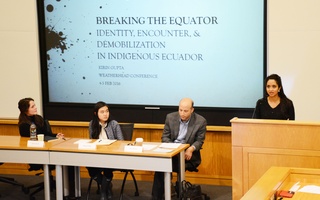{shortcode-e3fee8851be55e4ae14e6f6fed993e66a7930773}
As relieved seniors turn in their Social Studies theses—a requirement for the concentration—juniors are just gearing up for their capstone project and some say they underestimated the commitment such a project would entail.
Faculty and staff say that the Social Studies’ mandatory thesis is an intense project that likely requires summer research, leading some upperclassmen to worry about lost opportunities during their junior summer.
Bonnie M. Talbert, assistant director of studies for freshmen and sophomores in Social Studies, wrote in an email that the thesis is the centerpiece of the Social Studies curriculum.
“Our entire program is structured to guide and prepare students to write their thesis,” Talbert wrote.
Social Studies Peer Concentration Advisor Christian T. Kardish ’18 agreed.
“The whole concentration is basically developed around this project,” Kardish said.
While most students conduct research over the summer, Social Studies has no formal requirement for such an undertaking. However, Talbert wrote she advises students to “plan” for it.
“I generally tell students to plan to do some research over the summer before their senior year, so that when they begin their classes in the Fall they are prepared to start writing their thesis,” Talbert wrote.
Anya B. Bassett, director of studies in Social Studies, concurred in an email.
“We encourage students to apply for funding so that they can devote at least part of their summer to their theses,” Bassett wrote.
Bassett said she encourages students to work over the summer because funding is more readily available, and because on average, students who research over the summer have more “time and energy” and thus “write better theses.”
Talbert also said that many students’ topics demand “off-site” research.
But while students acknowledge they were warned about this expectation, some said they hadn’t anticipated how it would limit opportunities for internships.
“It’s different being told, ‘yeah, you’re probably gonna have to do some research over the summer,’ and realizing, [every internship] wants me to commit 10 weeks, and I don’t really have 10 weeks in addition to doing the four weeks that you have to commit for most research grants,” Dominique J. Erney ’19 said.
“[Summer research] is emphasized, and students might feel pressured to give up other summer opportunities,” Kardish said.
Devontae Freeland ’19 said that the expectation of summer research also “restricted” study abroad opportunities.
“I think being restricted to do research for a topic and limiting the ability to do summer study abroad programs, and needing to be in residence mid-year during the writing process, is really something that's making me rethink my plans for junior and senior year,” Freeland said.
As a result, Freeland is “reconsidering” his choice of concentration.
“Realizing that writing the thesis directly conflicts with the other things I want to do in terms of extracurricular commitments and my job has made me reconsider whether social studies is the right path for me,” Freeland said.
While Erney will be able to research and intern simultaneously this summer, she said many students are in the same position as Freeland.
“I know of people who are considering dropping Social Studies or are making plans to drop it because they decided that that was just not what they wanted to spend their time doing this summer,” Erney said.
Summer research may not be necessary for all students though. Some, including Kardish and Nuha Saho ’18, avoided summer research altogether. Kardish and Saho said that students are on “different timetables”.
“Looking back at it now, I was never actually behind. I assumed that I was, because I assumed that a lot of students were doing research over the summer,” Saho said. “But people were pretty much in the same place.”
However, though Kardish said he “managed it in the end,” he called fall and winter break research in Social Studies “stressful” and said he “felt that I was behind”.
Bassett acknowledged the “dilemma,” but said the thesis was worth the trouble.
“We are aware that spending time doing thesis research may make it harder to take long internships, and we are sympathetic to the dilemmas faced by students who want to do both. But we also think that writing a thesis is a once-in-a-lifetime opportunity,” Bassett wrote.
—Staff writer Cecilia R. D’Arms can be reached at cecilia.d’arms@thecrimson.com.Read more in College News
PBHA Holds Second Annual Housing Awareness WeekRecommended Articles
-
Harvard Gets $1 Million Gift To Promote China ResearchThe University yesterday announced that the John K. Fairbank Center for East Asian Studies has received a $1 million gift
-
For Off-Cycle Seniors, Thesis-Writing ConcludesMost Harvard seniors edit, toil over, and finally turn in their theses in a communal flurry in the weeks leading up to spring break and Housing Day each spring. But for the College’s off-cycle seniors, the affair is less standardized and a bit more lonely, they say.
-
The First SummerAs the newest members of the College who have not yet declared a concentration, freshmen face a limited pool of employers willing to consider them for paid summer internships.
-
 Seniors Present Research at Weatherhead Center
Seniors Present Research at Weatherhead Center -
 From Harvard to the Hill: Chuck Schumer’s Years at the College
From Harvard to the Hill: Chuck Schumer’s Years at the College













